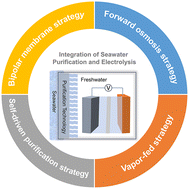Progress on smart integrated systems of seawater purification and electrolysis
Abstract
Water electrolysis powered by renewable energy could provide green hydrogen energy that has significant potential to build a near-zero-emission society. In addition to factors such as catalyst, membrane, and electrolyzer technology, the quality of water is coherently related to the efficiency of water electrolysis, which has garnered intense research interest recently. Impure water (represented by seawater) splitting is expected to enable broader access to water feedstocks and reduce capital costs, but it is currently facing huge operational challenges. To date, ultrapure water electrolysis with or without buffer ions has remained the most practical solution. The purification process is achieved through energy-intensive reverse osmosis technology traditionally, resulting in high capital costs and large ancillary facilities. In very recent years, researchers have been dedicated to integrating seawater purification and electrolysis into a single unit considering its significant advantages in hydrogen production efficiency, stability, energy consumption, cost, and system complexity. This minireview first highlights the progress in the smart integrated systems, then critically discusses their shortcomings, and finally provides perspectives for guiding future developments. The smart integrated systems are expected to provide a more flexible solution for green hydrogen production.

- This article is part of the themed collection: Celebrating the scientific accomplishments of RSC Fellows


 Please wait while we load your content...
Please wait while we load your content...